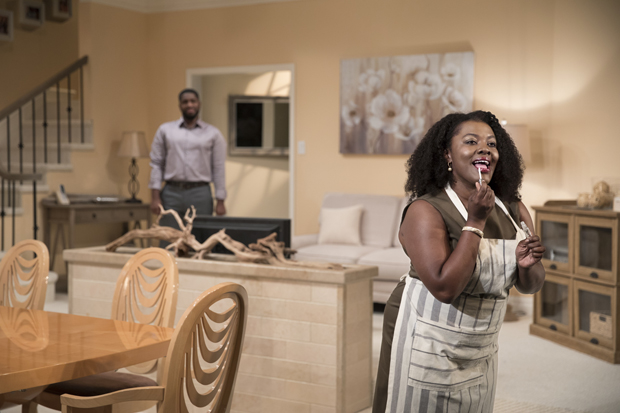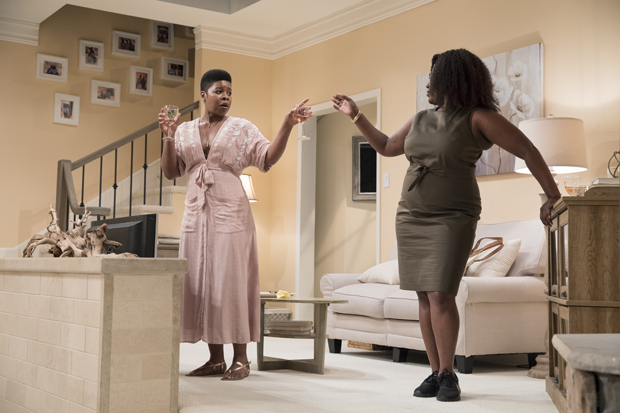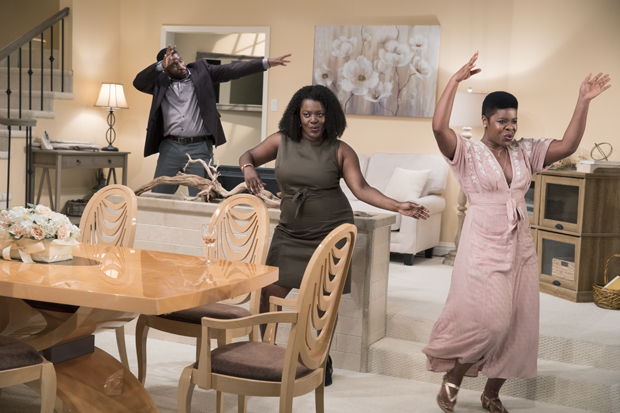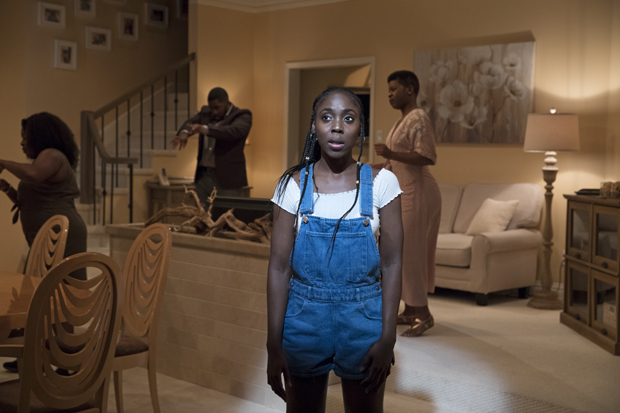The Difference between Your View and Fairview
Jackie Sibblies Drury’s newest play debuts at Soho Rep.

(© Julieta Cervantes)
Jackie Sibblies Drury's Fairview takes place in what looks like a Pottery Barn catalogue: Beige furniture rests serenely on wall-to-wall white carpet, all of it kissed by recessed lighting. We instantly recognize this aggressively neutral décor as intrinsic to an upper-middle class American home, presumably in a suburb called Fairview. But presumption is the path to disaster in this hilarious, provocative, and disorienting new play.
At first glance, Fairview is about the Frasiers, a bourgeois black family gathered to celebrate the birthday of the clan matriarch. Beverly (Heather Alicia Simms in a state of forced anxiety) peels carrots and checks her face in the mirror as her husband, Dayton (a charming Charles Browning), sneaks up behind her. Don't let his couch potato husband gym shorts and athletic socks fool you: These two make a great team. Dayton springs into action with the arrival of Beverly's sister, Jasmine (Roslyn Ruff bearing Rosé and deadly shade). Beverly's daughter, Keisha (a jubilant yet furtive Mayaa Boateng), returns home from basketball practice shortly after, attempting to recruit Jasmine in her campaign to convince mom to consent to a gap year between high school and college. But the absence of Beverly's attorney brother, coupled with her discomfort around Keisha's best friend, Erica, puts Beverly in no mood to negotiate.

(© Julieta Cervantes)
Drury successfully tricks us into believing that we're watching a live knockoff of Black-ish before blindsiding us in the second act with an entirely new layer: We hear the disembodied voices of Suze (Hannah Cabell), Bets (Natalia Payne), Mack (Jed Resnick), and Jimbo (Luke Robertson), a foursome of ostensibly liberal white people. They comment on the action like they're on Mystery Science Theater 3000. Much of their banter hinges on the question of what race (other than their own) they would choose to be and why, a cringe-inducting query that reveals the tendency (even among language-sensitive, fastidiously correct liberals) to essentialize people who are different. This leads to the surreal third act, which is way too bonkers and spoiler-filled to describe.
Drury is the author of the heftily-titled We Are Proud to Present a Presentation About the Herero of Namibia, Formerly Known as Southwest Africa, From the German Sudwestafrika, Between the Years 1884-1915, which played Soho Rep. in 2012. Like that earlier work, Fairview introduces us to an environment in which reality and personality crash at high speeds, like a theatrical hadron collider. Not since Branden Jacob-Jenkins's An Octoroon (also at Soho Rep.) has a play so thoroughly traversed the boundaries of race in performance, screwing with our perceptions while forcing us to recognize our blind spots.

(© Julieta Cervantes)
Director Sarah Benson (who also helmed An Octoroon) is ideally suited to Fairview. Her production stealthily slips across the border between realism and absurdism while slowly turning up the heat on us unsuspecting frogs in the audience. This wouldn't be possible without a cast that delivers ballsy, committed performances throughout.
The above-described set (by Mimi Lien) is essential to Benson's sleight of hand, as is Amith Chandrashaker's simultaneously subtle and magical lighting. Montana Levi Blanco's costumes take into account the relationship between aspiration and misconception when it comes to what we wear on our bodies. Sound designer Mikaal Sulaiman provides a soundtrack that will have you dancing in your seat. Benson's staging slowly builds to high pandemonium, thrillingly choreographed by Raja Feather Kelly and fight director J. David Brimmer. When you're not grinning, your mouth will hang agape at the sheer lunacy of it all.

(© Julieta Cervantes)
The play concludes with a bold and slightly uncomfortable experiment accompanied by an incoherent stream-of-consciousness monologue. It's a disappointingly weak ending, especially for a production that has hitherto felt completely self-assured. Then again, Drury makes it clear that this rambling conclusion isn't really directed at me, or most of the other people in the audience. Perhaps for Drury, the hesitant applause that follows is a small price to pay for telling the story she really wants to tell — one that seems very much a work in progress.










